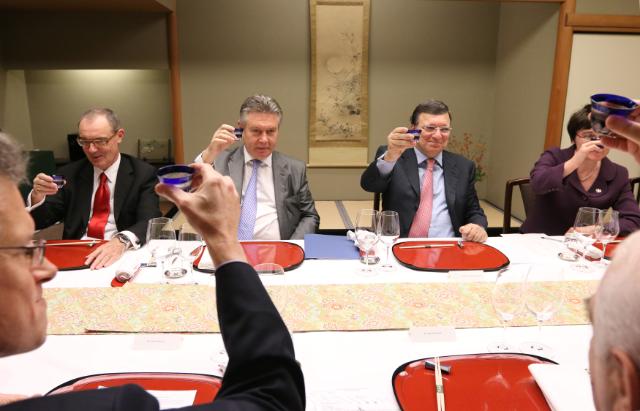FACTSHEET EU-Japan relations and the 21st EU-Japan Summit Tokyo, 19 November 2013
EU News 473/2013
15 November 2013
The European Union and Japan are like-minded strategic partners and major economies sharing common values and principles. Their 21st bilateral summit will take place on 19 November in Tokyo. The EU will be represented by Herman Van Rompuy, President of the European Council, and by José Manuel Barroso, President of the European Commission. Japan will be represented by Prime Minister Shinzo Abe. Trade Commissioner Karel De Gucht will also be present.
The summit will mark a major upgrade of EU-Japan relations following the official launch on 25 March 2013 of negotiations for a truly strategic partnership agreement to develop a wide ranging political, economic and social cooperation and an ambitious free trade agreement that is expected to stimulate growth and employment on both sides. Negotiations on both agreements started in mid-April and had progressed to their respective third round in October.
At the summit, leaders are expected to discuss:
EU-Japan political and economic relations. Economic developments and the political situation in both partner countries will be discussed, as well as the on-going negotiations for a strategic partnership agreement and a free trade agreement. Leaders will also give impetus for further progress in sectoral cooperation, including in the area of energy, research and innovation, space, disaster management and development cooperation.
Regional issues, such as recent developments in the EU's and Japan's respective neighbourhoods will be on the agenda. In this context, the Iranian nuclear programme, the situation in the Korean peninsula, Syria and the Sahel/Mali will be discussed. The EU will reaffirm its views on the need for a peaceful resolution of conflicts in accordance with international law, and underline the importance of further enhancing cooperation in strengthening disarmament and non-proliferation.
Global challenges, in particular the global economic situation and the G20 process. Japan and the EU account for around 30% of global output and thus have a major contribution to world economic stability to make. They have a special responsibility in this regard at the present time, when growth is decelerating in some large economies and there are pressures on emerging markets. For the EU, economic growth and financial stability go hand in hand, in line with G20 commitments. Leaders will also talk about development cooperation, climate change and crisis responses, including counter-terrorism, anti-piracy and cyber security.
A joint press statement is expected to be issued at the end of the summit.
Complete FACTSHEET (PDF)
David O'Sullivan, Chief Operating Officer of the European External Action Service (EEAS), Karel De Gucht, José Manuel Barroso and Maeve Collins, Deputy Head of the EU Delegation to Japan, all toasting (full-face, from left to right) Date: 18/11/2013 Reference: P-024327/00-19 Location: Tokyo (C)EU, 2013 URL














